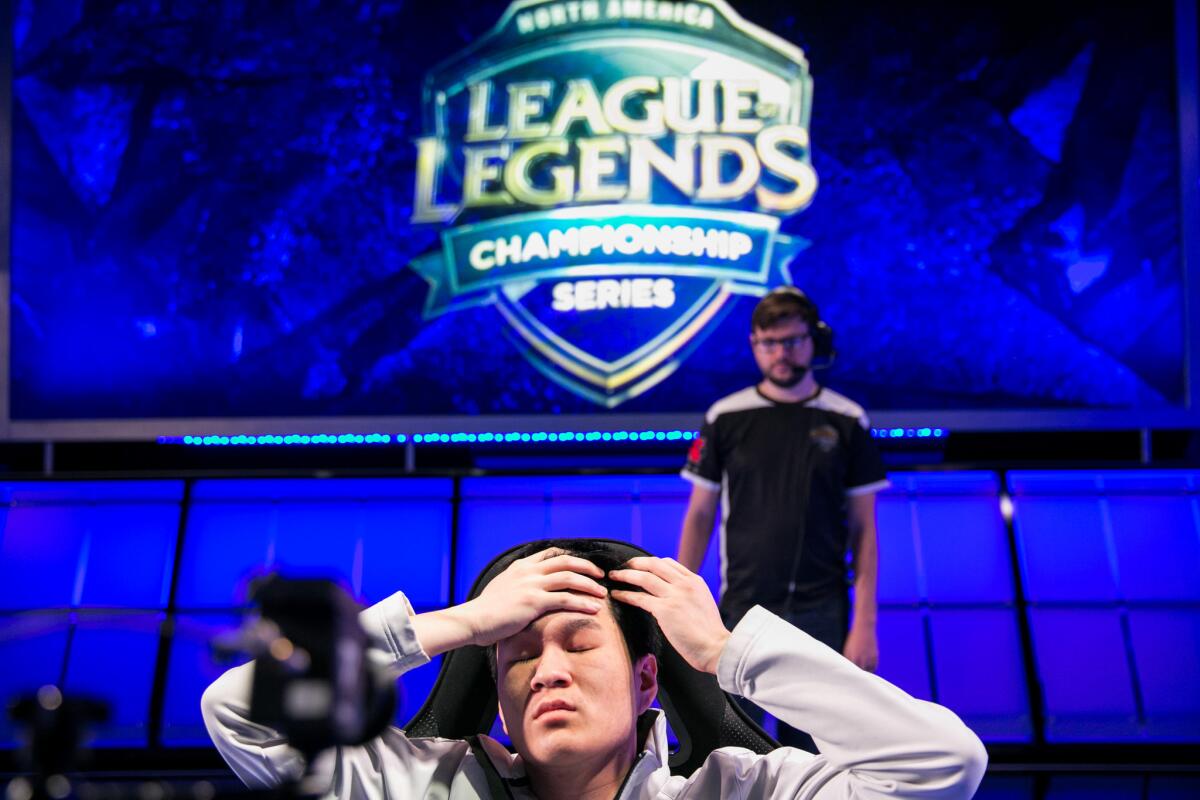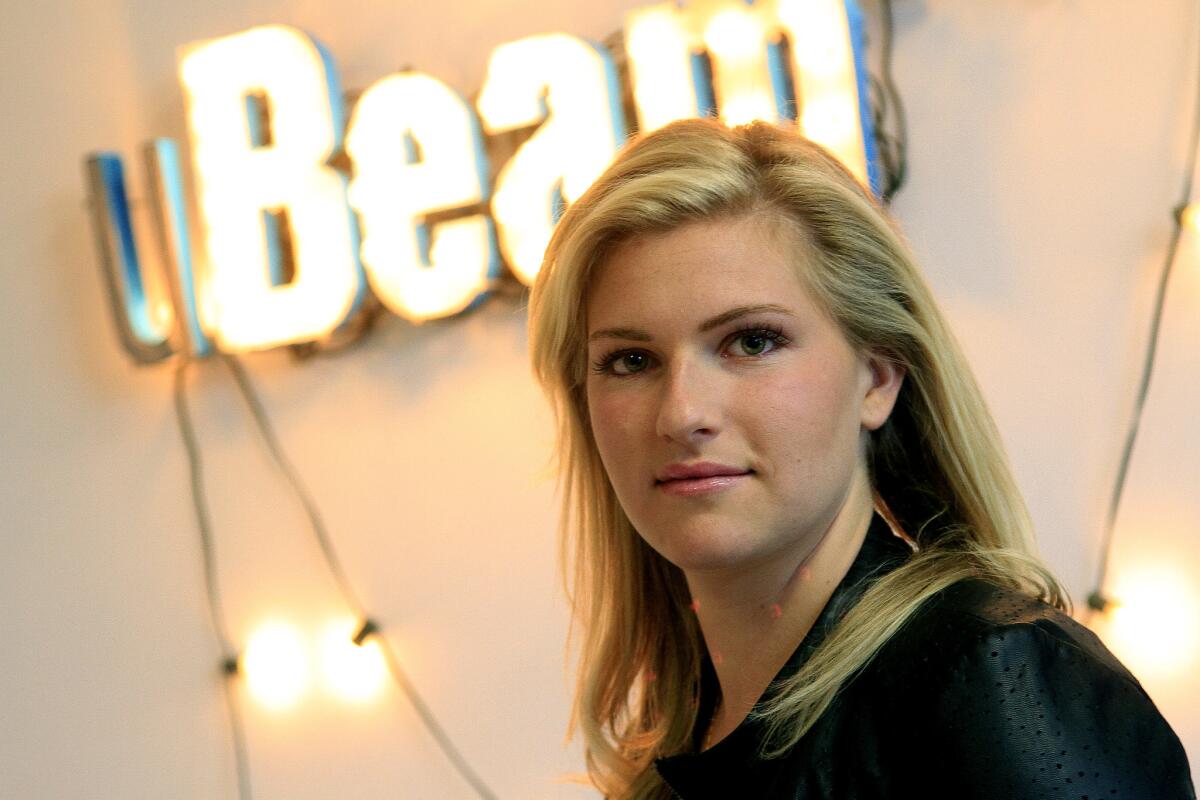Tencent’s Riot Games takeover and Dollar Shave Club sued among week’s L.A. tech highlights

A competitor takes a moment to stretch during a “League of Legends” tournament match at the Riot Games studio in Los Angeles in April.
- Share via
One of Los Angeles’ top start-ups is now completely off the block.
Riot Games Inc., maker of the online battle game “League of Legends,” recently sold the last 7% of shares held by the company and employees to Tencent Holdings, giving the Chinese conglomerate complete ownership. Tencent first invested in Riot in 2009, eventually spending $232 million in cash in 2011 to take majority control. Terms of the latest purchase were not disclosed.
Riot is keeping quiet about why it sold off the last share block. Here are three possible ways to read the deal: one great, one good, one ugly.
Great: Riot said it would begin offering cash bonuses instead of stock options to employees, as part of the transaction. The stability offered by the compensation scheme could help Riot attract a different set of workers. Riot employs more than 1,000 people at a vast campus in West Los Angeles, and many more work around the world. Some experts buy that rationale.
“I’m really bullish,” said Clinton Foy, a venture capitalist specializing in gaming at Crosscut Ventures. “It’s a highly profitable company, a good place to work and their community loves ‘League of Legends.’ Those three things are hard to do individually, and together it’s nearly impossible.”
Furthermore, with “League of Legends” humming along nicely, maybe Riot cofounders Brandon Beck and Marc Merrill felt like giving themselves a nice Christmas present by selling the rest of their shares.
Good: Up to 100 million people play “League of Legends” on their computers each month, together spending more than $1 billion annually on optional add-on items to improve their experience, according to analyst estimates. (Riot said in early 2014 that it has 67 million monthly players.)
Tencent has strong incentive to completely control that revenue stream. China is perhaps the largest market for “League of Legends.” SuperData Research counted 21 million players in China as of mid-2014. Newzoo, another research firm, says at least 40 million of the game’s 85 million players are from China. The numbers make “League of Legends” an attractive service to market other Tencent games and apps.
Maximizing its take of Riot’s profit also leaves Tencent with more cash to invest in other U.S. gamemakers as it tries to get a bigger toehold here. And Riot is by far the biggest purveyor of eSports, or video game competitions. Tencent aims to “dominate eSports in China” because it’s a key route to long-term revenue growth, says Newzoo’s Peter Warman.
Ugly: After Tencent’s 2011 investment in Riot, other shareholders gained the right to force Tencent to buy their shares at a specific price anytime during the following 10 years, according to Tencent’s financial report at the time. So it seems odd that a sale would happen not even five years into that period. Is it a sign that the game -- and the value of those shares -- has peaked? Riot said it’s working on a second game, but a release date hasn’t been announced.
“Without more details you can not read too much into” the issue, “but clearly there is an overall issue of does Riot have an Act Two,” said video game industry analyst David Cole of DFC Intelligence.
Publicly traded Tencent doesn’t separately report Riot’s financial results, and investors haven’t pushed for that data. But the broad computer-games category under which Riot falls has seen “healthy” and “low double-digit growth” in recent quarters compared to “strong” and high double-digit growth for mobile games, according to Tencent.

Dollar Shave Club founder Mike Dubin, right, talks with his assistant Kristina Kovacs in his office during a meeting.
Shaved off: Gillette is going to court to take on Dollar Shave Club, the grooming products’ rival whose lower prices and ship-to-home business model has attracted millions of consumers and more than $100 million in annual sales.
Gillette alleges in a patent infringement lawsuit filed last week in U.S. District Court in Delaware that Dollar Shave Club’s razors illegally borrowed ideas aimed at make the blades more durable. Marina del Rey-based Dollar Shave Club and its investors, who’ve given the start-up about $150 million and valued it at $630 million, aren’t commenting on the lawsuit.
Gillette, owned by Procter & Gamble, wants a judge to halt sales of the razors. In 2008, Gillette also sued manufacturer Dorco over shaving patents. Dorco is now a supplier to Dollar Shave Club. The Dorco case was confidentially settled, and attorneys for the company declined to comment.
L.A. to D.C. Former Los Angeles City Councilman Jack Weiss is now president of an app start-up in Bethesda, Md. His company, BlueLine Grid Inc., announced an undisclosed investment from Motorola Solutions’ venture capital unit last week. BlueLine previously raised funds from In-Q-Tel, the venture fund tied to the CIA. BlueLine sells encrypted chat and data-sharing services to law enforcement and first responders. Weiss, a former federal prosecutor, served on the city council from 2001 to 2009.

Meredith Perry of Santa Monica start-up uBeam has received funding from Mark Cuban and Marissa Mayer.
Elsewhere on the Web. Marie Claire has short profiles on Meredith Perry, founder of wireless charging technology start-up uBeam, and Whitney Wolfe, a former executive at dating app Tinder. Perry says she’s been taking meetings with potential customers, such as hotels, airlines and restaurants. Wolfe, who went on to develop the dating app Bumble, says she originally envisioned the service as a social media app for teen girls. But her current partner, European entrepreneur Andrey Andreev, encouraged her to turn into a dating service.
In case you missed it. Our tech team put together a list of gadget gift ideas including drones and robot vacuums, and our resident grinch Tracey Lien told them why they’re all terrible. Virtual reality, connected cars, e-sports, Snapchat the on-demand economy — all are becoming important elements in the Southland economy, and all are poised for rapid growth in 2016. We made predictions for each.
Tastemade, a Santa Monica-based digital network for food and travel videos, closed a $40-million round of funding led by Goldman Sachs. RideAmigos, based in Venice, is developing ride-matching software to revive the decades-old idea of carpooling to work. And University of California officials announced the launch of a $250-million venture fund led by entrepreneur Vivek Ranadivé that will invest in innovation from the UC ecosystem.
Chat with me on Twitter @peard33







